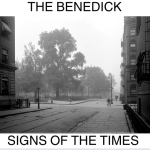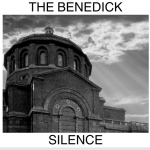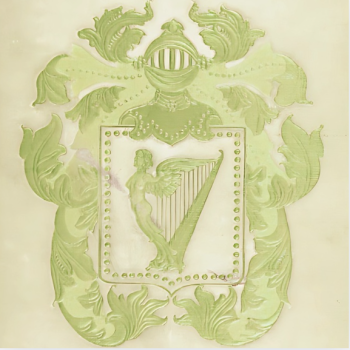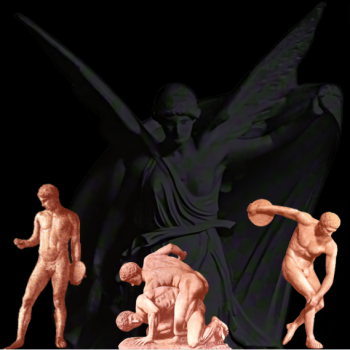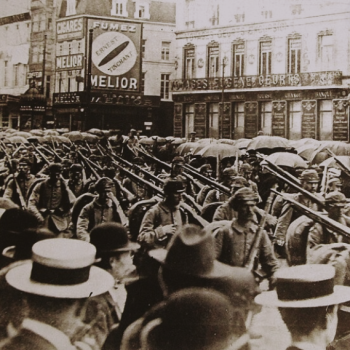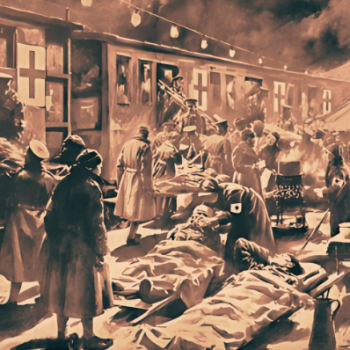HAS THE CHURCH FAILED?
July, 1907.
The following discussion occurred sometime in the week of July 21-July 27, 1907, when New York was experiencing a heatwave.
⸻
Some weeks later Manhattan was scorching in a sudden breathless heat. Mitchell’s personal affairs had kept him in town longer than was his wont, till he had grown used to solitary dining in deserted clubs and restaurants. This afternoon, however, as he passed from the quivering glare of the streets to the dim quiet of the club, he had met Robinson. He two dined together, and later walked to The Benedick, where they were now seated before the low, wide window.
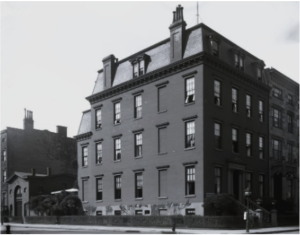
Columbia University Club, 18 Gramercy Park, New York City.
The night breeze had finally come, and with it a hint of freshness from the distant sea. They had been talking of Robinson’s new work, The Development Of Modern Europe, and of the endless patience and labor involved in the search for the original sources—the vast mass of possibly doubtful material which must be examined only to be rejected, the care with which evidence must be weighed and sifted—and yet the richness of the reward.
“I wish,” Robinson said, “that we could wipe out all the second-hand opinions of history, all the overgrowth of tradition and prejudice, and force the world back in each case to the original records, or, let us say, a clear translation of them, for its information. Perhaps, then, we could see things as they were. But now it is all overlaid with centuries of imaginings. Do you know what has done us the most harm?” Robinson asked. “It is the dramatic and literary instinct. It requires constant watchfulness not to write drama rather than history; to keep oneself down to the bare facts which are known to us, and not weave around them a fabric of our own. And it is simply astounding how error perpetuates itself; how something once printed is quoted and assumed, and appears and reappears again and again, in the most diverse places, till you can scarcely believe so much could have sprung from so little. Until we popularize the sources we shall never be able to separate the facts from the fictions which cling to them.
“After all, there is no study so fascinating; for it is our own nature that history reveals to us. History is the great enlightener. If we would only live by its light! Do you know, Henry, I believe that nine-tenths of the trouble with the Church today is due to simple ignorance of history. The ordinary clerical attitude toward the Church, particularly towards its creeds and dogmas, would be simply inconceivable if their actual historic origin and development were understood. I do not know what the reason of it is. Partly, I suppose, the tendency to repeat error, like parrots, from which we all suffer. And more, I suspect, is accounted for by our habit of leaving what we learn unassimilated; isolated in its own pigeonhole—as though it had the measles and must be kept from the other occupants of our minds; whereas the spread of the contagion which it carries is the best service a fact or idea can do for us.
“I doubt if we make enough of anything that we know—that the earth moves round the sun, or that ants keep cows. I am sure we do not make enough of the doctrine of evolution. We talk about it at wearisome length, but we do not even yet assume it in our habitual thought of ourselves. It would make a wonderful difference if we really would look at our own lives from that standpoint. We adopt it readily enough toward the lower orders, but not with ourselves—not as applying to that part of us which itself assumes standpoints. We shrink from realizing that our intelligence is not a ready-made hand-me-down, not some perfect, immutable principle fresh from God. But, in truth, it is different to-day from what it was in the past, or what it will be in the future. Our minds carry over with them into the present much that belongs to past conditions. Much of us really pertains to the cat and dog stage of development. There are atrophying ‘meows’ and rudimentary tails in our minds as in our bodies. We are continually trying to make our conditions square with our wants. We should make our wants square with our conditions. And we could do this if we would but realize how our wants have arisen; how many of them are anachronisms, survivals of a finished past.
“It is pathetic to me to see how the clergy live in fear of present facts. They are in constant dread of some discovery which will upset all their edifice of dogma, and they cannot tell from what quarter the blow may fall. It may be a papyrus newly uncovered in Egypt, or some ancient manuscript left moldering through the centuries in a forgotten monastery, or it may be from the laboratories of our chemists and biologists. They cannot tell. All they know is this feeling of vague alarm; the pressure of the young present upon the lingering past; the pressure of facts upon theories that are out of tune with facts. Why, they have a regular system of defense; scouts and pickets which waylay any new ‘scab’ idea, and, if they cannot stop it, try to assassinate it. Reading some of the clerical papers, you would think religion was on strike against progress, and, refusing to work there itself, was still desperately afraid its place would be taken by a better artisan.”
“I recognize the picture,” said Mitchell. “But it is not the portrait of religion, however true to some members of the Church.”
“I know your view of religion as the image of our next step in evolution,” said Robinson. “That would be just as it should be—just what we would like it to be. But the trouble is that religion always seems to mirror the past and not the future; to remain itself upon the preceding step, crying out upon all who venture to advance. The Church is constantly going back.”
“That is organization, not religion,” said Mitchell.
“Yes,” said Robinson, “but the Church is an organization, and religion is always organizing. Remember what Percy said of his love and need for organization; and he is far more progressive than the clergy as a whole.”
“I have a great admiration for our friend, Percy,” said Mitchell. “I admire his courage, his force, and his effectiveness. He is always in dead earnest about his work. He represents an element in the Church which stands for genuine helpfulness and for genuine religion. He is content to leave outgrown formulas aside, neither attacking nor defending them, but re-emphasizing spiritual reality and the worth of spiritual experience. He keeps his eyes on what has to be accomplished, and I think it is the tremendous effectiveness of organization that most appeals to him. Here is an instrument ready to his hands. By means of it he can reach thousands of people, where alone he would reach tens. He wishes to use it, not to be its slave.”
“But it is so largely discredited,” said Robinson. “One rarely treats a pulpit utterance seriously in these days. You take it as part of the ceremony, part of what is expected, and so without significance, like the formal inanities of social intercourse. You may really ‘ have had a delightful time,’ but no one would think of taking you seriously when you say so. It would seem to me that the pulpit would be the last place in the world from which to start a genuine reform, and that the Church must be more of a hindrance than a help.”
“Nevertheless,” said Mitchell, “there is there today the genuine religious spirit which is moving such men as Percy, and which gives the hope that the Church, as a whole, may yet follow it. That is why I championed the Church against your exposition of its failure as an historic institution. There is, today, a better chance for it than ever before. Can the new spirit win? If so, the Church is far too valuable, potentially at least, far too effective, to be dismissed as a failure. Look at the work Percy is himself doing, not only in broadening and deepening the religious beliefs of his congregation, but also in civic betterment. His church is a real factor in the neighborhood. Where I see work like that I want to pitch in and help.”
“The trouble is that organization, particularly church organization, inevitably tends to get into the hands of older men,” said Robinson. “It must always crystallize about what has been; about the opinions of the majority, not of the few. Therefore both its form and its ruling spirit is always of the past—an encumbrance upon progress. You think that despite this it may be made valuable? But surely all this ceremonial and totemism is anachronous—sheer survivals from barbarism; fossil remains, preserved in organization, of a life long departed.”
“I think there was a point in what Miller said of ceremony and symbols. The variations of ordinary dress are more noticeable and disturbing to me than the uniformity of a surplice. We need symbolism, I suspect, but we need still more to recognize it as such, and bend all our energies to the reality beyond. There is value in ancient tradition, if we use it as a means, not an end.”
“But why should we try to force the new into the old forms?” asked Robinson. “Did not Jesus himself say that no man puts new wine into old bottles? The world is not the same as it was two hundred years ago. Why should we try to deform the growing present by forcing it into outworn moulds? The attempt to square the geology of Genesis with the geology of science is simply pitiable.”
“No one cares about the geology of Genesis,” Mitchell replied.
“You mean that you and I do not,” said Robinson. “But there are many who do. Fifty years ago it was a burning question for all. I referred to it, though, only as an example, typical of much else—of the desperate running fight the Church has made, always obstinate, but always forced to yield, always defeated.”
“And only seeing afterwards that defeat was not loss but gain,” said Mitchell.
“That is it exactly,” said Robinson. “But the Church has never learned the lesson—nor, do I think, have most of us. We need to recognize that the intelligence of man is itself capable of evolution and that it must leave behind it the things it has outgrown. We are such cowards here, we cling to the familiar simply because it is familiar. We dread the new. At least many do—not all. Dewey is right. It is an individual matter. We must make our minds conform to conditions; not be continually seeking to build systems to suit our desires. We should eliminate desires that do not fit the facts, not strive to gratify them. There are those two ways of gaining satisfaction. But the one establishes us firmly upon nature itself; the other puts us at odds with facts. And in the end facts have a way of triumphing, when all our work must be done anew. But worse than this, our systems always cramp us. We have to carry our fools’ paradise around with us, fearful lest if we once overstep its borders we may never return.
“The Church is constantly fettering the spirit. The whole tendency of Christianity is to put as many veils between our intelligence and the universe as possible. No one seems to realize how it superimposed again upon humanity what the best pagan minds had succeeded in eliminating. The freedom which Plato and Cicero and the educated men of Greece and Rome had acquired, their direct view and acceptance of life, were all wiped out with Christianity, and this great mass of infantile cosmology again imposed. If we do attribute, as Percy did, the moral betterment of man to Christianity, we must also count the cost at which it was obtained. But those vices were never prevalent in Germany, for instance. Probably they existed only in certain Mediterranean centers. Nor do I believe vice was so much more universal in Greece and Rome than it is today in our large cities. Certainly American Paris cannot claim to be moral. Of course, the scholars and literary men are less frank now than they were. Probably they are better, too. Though where you will find Plato’s peer is hard to see. Surely in his ‘Laws’ he is as outspoken as Percy against unnatural vice. But, on the whole, it seems to me that all these two thousand years have only seen a detour so far as religious thought has been concerned. I do not see that Christianity has brought us as much as it has taken away. I do not particularly turn to the Bible for stimulus and help. I read it for its style—and with deep wonder at many of the sayings of Jesus, at his character and teaching. But I do not get as much stimulus from them as I do from the life of Leslie Stephen, for example. Jesus’s problems were not mine, while Stephen’s were. I do not particularly want to do what Jesus did; while Stephen’s is just the type of big, strong, sane, all-round mind that I admire. How is it with you? Where do you look for strength? Do you turn to the Bible in your own troubles?”
“It depends, I think, upon the kind of trouble,” replied Mitchell. “I go often to the teaching of Jesus; rarely, if ever, to any other part of the Bible. There are a number of books I use in this way. I suppose everyone has his favorites. I am very fond of Thomas à Kempis and of parts of St. Augustine. But Light on the Path and the Bhagavad Gita, and many others, Marcus Aurelius, and Epictetus, and Emerson, Fenelon and Father Guillore, are quite as dear to me. I am particularly fond of all the mystics, and find helpful the records of all those who were trying to broaden and uplift their consciousness. That is an awkward description, but it will show the kind of book I mean. [see Mitchell’s essay, “Meditation.”]
“You like Maitland’s Life of Leslie Stephen because it helps you do what you are trying to do. It helps you live your own human life cleanly and forcibly and effectively. As you said, Stephen’s problems were much your own, and the way he bore his burdens helps you to do the like. But beyond this there is something more. There is the reality of the spiritual life. And here I think such difference as there is between us has its origin. To me this reality is the one supreme fact of life; while to you it still seems a matter of impersonal speculation.The kingdom of heaven is to be entered here and now. As Jesus said, it is ‘at hand.’ There is a new type of spiritual consciousness which can be attained—the consciousness of the heavens. It is our next step away from the cat and the dog and our rudimentary mental tales. And it is also the great adventure, the call to which is eternally vibrant in our hearts, and upon which the mystics of all the ages have entered. Some description of this consciousness they have left behind them, with some record of the road thereto, to help those who follow after. This is what I am trying to do—believing in its reality, its human possibility, and its infinite value. Therefore it is that Jesus’s sayings have for my efforts the same intimate personal application that you find in the thoughts of Leslie Stephen. For I do not look upon them as remote morality, but as descriptions of a road I would travel; or as the science of the soul’s growth and life, as exact and definite as the science of chemistry, and, like it, to be verified only by experiment.
“The second difference between your view and mine flows, I think, naturally from this, and seems to me really to lie in the question as to whether or not we are in the front rank of evolution. If we are, then each step we take is indeed new, and so, of necessity, an abandonment of the past. But if, on the other hand, others have gone before us, then may the life of personal religious experience have been the same from time immemorial. As we advance we may grow nearer to all the great of all the past, and enter into a subtle sense of comradeship and communion with them. This latter seems to me the truth; and therefore I am the more hopeful for the ancient systems; hopeful that they will throw aside the overgrowths of ages and turn once more to their true mission, leading men to the heritage of the spirit and emphasizing again its reality and its worth. This is my hope. Whether it will be justified or not I do not know. But it is at least a hope worth fighting for—and more than that we do not need.”
“I think you have come very close to the heart of the matter in what you have been saying now,” said Robinson, “though I agree with your first point more than with your second. I do not know how to describe personal religion. As I said, it seems not the same, but still akin to the sense of beauty; the appreciation and delight in art and music and nature seem all akin to the religious sense, and we think of them first in seeking similes for it. But perhaps we can do no better than dwell on the old idea of love and peace, which may be felt and radiated. The acquirement of such peace, if one could gain it, must bring the greatest help and benefit not only to oneself, but to others. This is, indeed, very much worthwhile, if it can be acquired. I had thought of it more as a matter of temperament, as something we were born with or without. I had not thought of slowly inculcating it in oneself, or of its being the aim of religion. I should think, from the echoes of the Eastern religions that have reached me, that they were more fitted to teach this, and probably had been more successful in imparting it, than had Christianity. Christianity does not seem to have bent its efforts to this, nor paid much heed to it. Nevertheless, you believe that it always has been in Christianity, and that, despite the sins of the Church, despite its long record of obstruction and the dwarfing of the spirit, despite all this, you believe that the Church may still be used to teach genuine religion?”
“I believe there is a fighting chance for it,” said Mitchell, “and while there is that I mean to fight.”
“I do not,” replied Robinson, “I am not so optimistic. This side of it I must leave to you or others. But on the personal side I agree with you; that, strange as it may seem to you, satisfies me. More goes on within each one of us than others ever guess. And this seems very true to me, very well worthwhile. I am glad you said it. Now I think I shall walk home. Good night, Henry.”

View of Washington Square Park, from the southwest.
Mitchell walked to the window, and looked upon the cavernous streets of Greenwich Village. Captivated by the still spaces of the night, Mitchell stared into the heavens; the stars in their wide courses held his gaze, paling in the summer dawn. Before him came the vision Grant had drawn of the spirit of Christ waiting and working through the centuries till He could come again into the hearts of men—His meaning and His mission understood. “I, Jesus, am the bright, the morning star,” the vision said. “Surely I come quickly.”
⸻
Exordium: Conscientious Clergyman.
Chapter I. The Nature of the Inquiry.
Chapter II. Christianity and Nature.
Chapter III. Evolution And Ethics.
Chapter IV. Power, Worth, and Reality.
Chapter V. Pragmatism and Religion.
Chapter VI. Mysticism and Faith.
Chapter VII. The Historian’s View.
Chapter VIII.Organization and Religion.
Chapter IX. The Theosophical Movement.
Chapter X. Signs of the Times.
Chapter XI. Has the Church Failed?
Chapter XII. Silence.
CITATIONS:
Higgins, Shawn F. “The Benedick: An Analysis of Talks on Religion.” Dewey Studies. Vol. VI, No. 2. (2022): 16-75.


